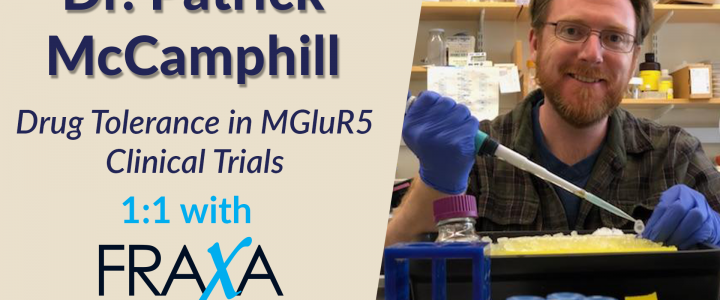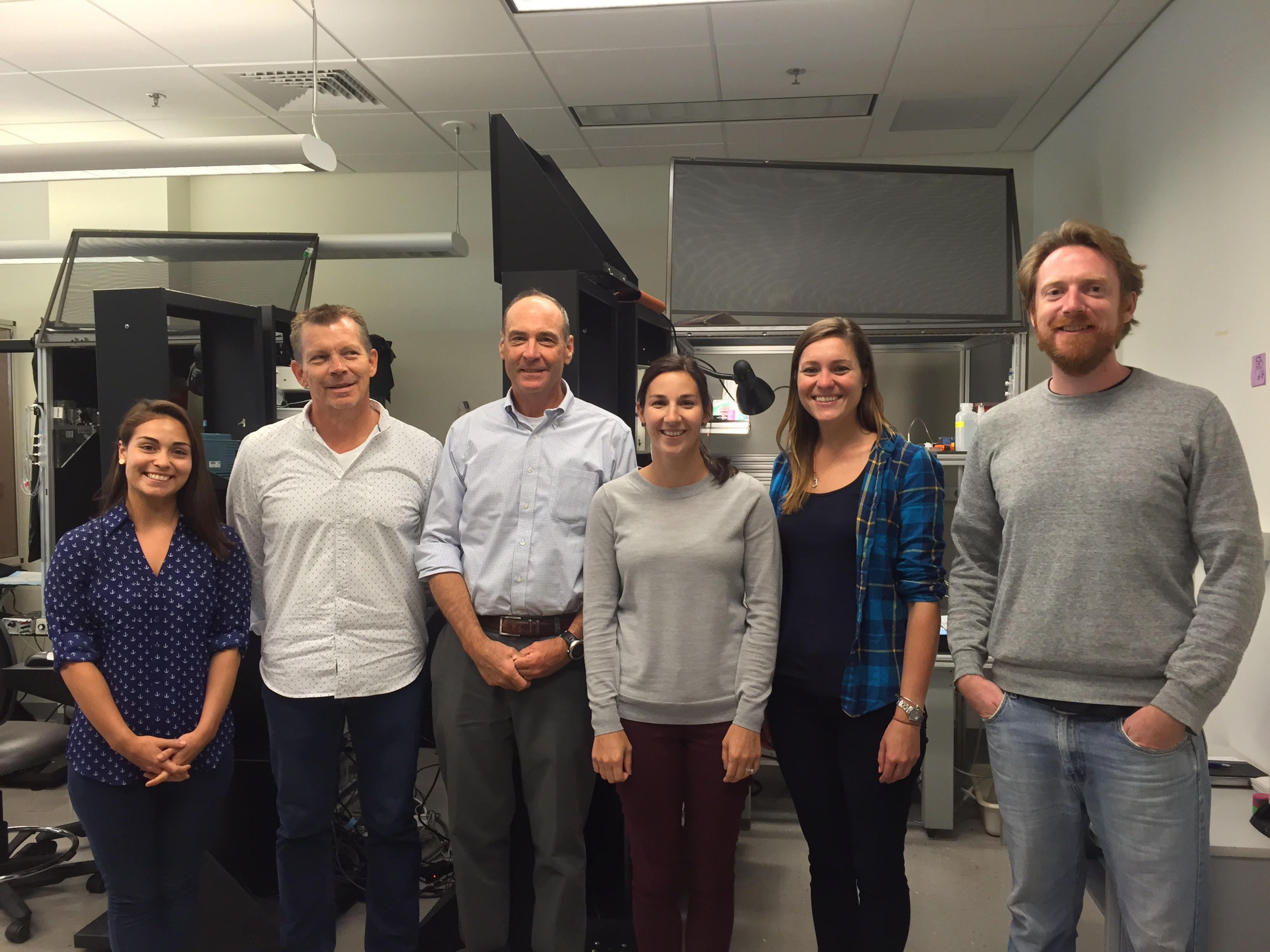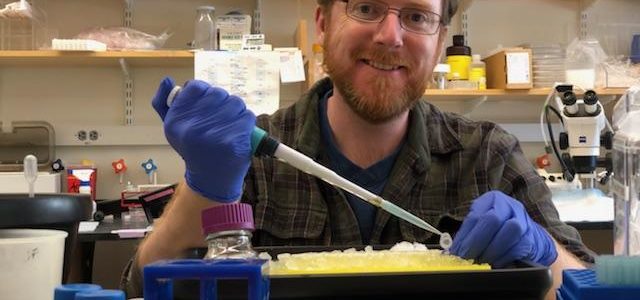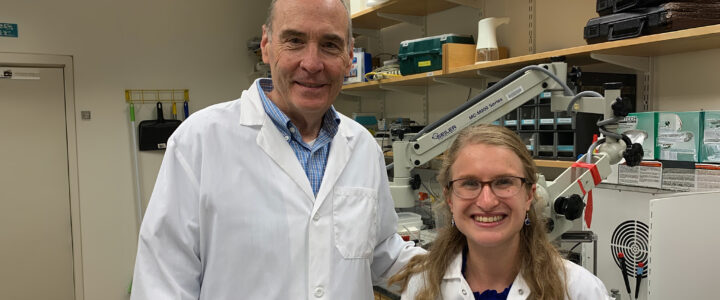Discover how a $100,000 FRAXA grant supports research at MIT targeting neuron dysfunction in Fragile X, aiming to develop new therapies to improve sensory processing and behavior.
Read moreBear, Mark
Mark Bear, PhD, Picower Professor of Neuroscience at the Massachusetts Institute of Technology (MIT), studies synaptic functions in Fragile X syndrome and other autism spectrum disorders. He has worked with FRAXA since 1999 and is a member of FRAXA’s Scientific Advisory Board.
Allos Pharma Advances Phase 3 Clinical Trial Design for Potential Fragile X Syndrome Treatment, Arbaclofen

Discover Allos Pharma’s advancements in a pivotal Phase 3 trial for Fragile X syndrome treatment, Arbaclofen. Learn how their FDA-informed trial design might finally bring hope to the Fragile X community.
Read more20 Years of Advancing Fragile X Research: Progress Toward a Cure

Dr. Mark Bear joined the Fragile X field in 1999 when he received a research grant from FRAXA Research Foundation. At the time, we recognized the symptoms of Fragile X, and we knew its cause: a single missing protein. But we knew very little else. Dr. Bear traces the discoveries that now give us great optimism of finding effective treatments and ultimately a cure for Fragile X.
Read moreDrug Tolerance in MGluR5 Clinical Trials – Dr Patrick McCamphill 1:1 with FRAXA

We have long suspected that the clinical trials of mGluR5 blockers from Novartis and Roche failed because the drug triggered tolerance, losing effect over time. With a $90,000 grant from FRAXA, Dr. Patrick McCamphill, a Postdoctoral Fellow in the MIT lab of Dr. Mark Bear, is investigating. He does indeed find tolerance, and now he is looking for ways to overcome it.
Read moreDeveloping Arbaclofen for Fragile X – Dr. Mark Bear 1:1 with FRAXA

Seven years ago, arbaclofen (STX209) was pulled from development, disappointing families around the US. Now MIT professor and FRAXA Investigator Dr. Mark Bear has founded Allos Pharma to bring it back. Dr. Bear sat down with FRAXA co-founder Katie Clapp to share the story and next steps.
Read moreAllos Pharma Revives Arbaclofen After 7 Years: New Hope for Fragile X Syndrome

Experience the revival of arbaclofen as Allos Pharma Inc launches a new development program, providing renewed hope for the Fragile X community. Discover the impact of this experimental drug and the determination of those who never gave up.
Read moreScientists Find a New Way to Reverse Symptoms of Fragile X

FRAXA Investigator and MIT Professor Mark Bear and his colleagues have identified a valuable new target for Fragile X therapeutics: GSK3 alpha. Several FRAXA research teams previously identified GSK3 beta as a treatment target for Fragile X. The catch is that, so far, GSK3 beta inhibitors have proven too toxic for regular use. Dr. Bear’s new discovery opens up the possibility of developing more selective compounds with less toxicity and fewer side effects. Interestingly, lithium inhibits both GSK3 versions – alpha and beta.
Read moreEnhancing NMDA Receptor Signaling to Treat Fragile X Syndrome

Dr. Stephanie Barnes investigated the role of NMDA receptors as a FRAXA Postdoctoral Fellow in Dr. Emily Osterweil’s laboratory at the University of Edinburgh from 2016-2018. With an additional year grant from FRAXA, she then continued her work to identify novel targets and test pharmacological therapies in the Fragile X mouse model at the Picower Institute at MIT with Dr. Mark Bear. Results published.
Read moreSpectrum News – Newly Discovered Aspects of Fragile X Spur Next Wave of Drugs

Many drugs for Fragile X syndrome have failed in large clinical trials, but candidates that target new aspects of the condition may fare better.
Read morePharmacological Tolerance in the Treatment of Fragile X Syndrome

With a $90,000 grant from FRAXA Research Foundation over 2018-2019, Dr. Patrick McCamphill, postdoctoral fellow in Dr. Mark Bear’s lab at Massachusetts Institute of Technology (MIT), is investigating drug tolerance to mGluR5 antagonists, arbaclofen, and other potential Fragile X treatments. He is also exploring ways to overcome it.
Read moreMechanisms of Tolerance to Chronic mGluR5 Inhibition

Over the past few years, both Novartis and Roche sponsored large-scale clinical trials of metabotropic glutamate receptor 5 (mGlu5) negative allosteric modulators (NAMs) to treat Fragile X syndrome (FXS). With a $90,000 grant from FRAXA Research Foundation in 2015-2017, Dr. Mark Bear’s team will explore if mGlu5 NAMs dosed chronically causes tolerance, and if so, how it develops and to probe new avenues to prevent or circumvent it.
Read moreDevelopment of a High-Content Synapse Assay to Screen Therapeutics for Fragile X Syndrome

With a $45,000 grant from FRAXA Research Foundation in 2009, Dr. Mark Bear and Dr. Asha Bhakar used High Content Screening (HCS) to develop an assay sensitive to the effect of the FXS genotype. This project was funded in full by NIH after the first year.
Read moreMark Bear’s Goal: Disease-Modifying Treatments for Fragile X

Researcher Mark Bear, PhD, Picower Professor of Neuroscience, sees success developing disease-modifying treatments for Fragile X syndrome and other developmental brain disorders. Finally, hope. And it comes from his lab, The Picower Institute for Learning and Memory, Department of Brain and Cognitive Sciences, Massachusetts Institute of Technology.
Read moreLovastatin Discovery in Fragile X Mice Leads FRAXA to Fund Clinical Trials

Dr. Emily Osterweil was awarded the FRAXA Pioneer Award at the opening dinner of the 2011 FRAXA Investigators Meeting in Southbridge, MA for her work demonstrating that Lovastatin could treat Fragile X. Dr. Osterweil conducted her experiments in the MIT laboratory of Dr. Mark Bear and has since established her own laboratory at the University of Edinburgh. The team discovered that lovastatin, a drug widely prescribed for high cholesterol, can correct excess hippocampal protein synthesis in the mouse model of FXS and can prevent epileptogenesis. The work is published in the prestigious neuroscience journal Neuron: Lovastatin Corrects Excess Protein Synthesis and Prevents Epileptogenesis in a Mouse Model of Fragile X Syndrome.
Read moreRole of Excessive Protein Synthesis in the Ontogeny of FXS

With a $90,000 grant from FRAXA Research Foundation in 2010-2011, Dr. Mark Bear and Dr. Miquel Bosch tested the simple hypothesis that the excessive rate of protein synthesis is not a consequence but the primary cause of the structural alterations occurring in Fragile X syndrome.
Read more
